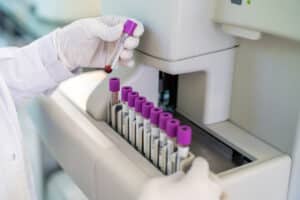Services Offered at Our Preventive Cardiology Clinic

For the professionals at South Denver Cardiology, there’s only one thing better than using our advanced, industry-leading and life-saving technology and techniques: keeping our patients healthy so they never need these treatments. That’s the job of our Preventive Cardiology Clinic: identifying people at risk of cardiovascular diseases and helping them live healthy lives that reduce their cardiovascular risks.
Our recommendations for lifestyle, diet, and diagnostic testing are consistent with the latest science. With our patient-centered approach, we take those recommendations to meet you where you are, with customized strategies that you can actually implement without turning your life upside down. This combination of scientific knowledge and a personal touch helps our patients feel better physically and mentally.
What Is Cardiometabolic Preventive Care?
Cardiometabolic combines the words “cardio,” meaning “heart,” with metabolism, which is a description of how your body acquires, uses, and stores energy. When considering the health of your heart, we can’t leave out this other part of the equation, which can have a profound effect on many aspects of your heart’s function.
The American College of Cardiology estimates that about 47 million Americans are living with cardiometabolic disorders, including:
- Hypertension (high blood pressure)
- Elevated fasting blood sugar
- Dyslipidemia (high levels of fats in the blood, including triglycerides)
- Abdominal obesity
All of these are risk factors that can contribute to the development of more serious cardiovascular conditions. That’s the goal of cardiometabolic care: reducing your risk of serious cardiovascular disease that can be dangerous, even deadly.
Who Needs Preventive Heart Care?
Ideally, everyone should be taking steps to keep their heart healthy. However, not everyone needs preventive cardiometabolic care. When considering patients for our preventive clinic, we are looking for candidates who:
- Have a family history of heart disease, including heart attack and stroke
- Tested high for cholesterol or triglycerides
- Are interested in advanced assessment for heart disease
- Want to improve their heart health
- Have already had a stroke or heart attack
If you fit into one or more of those categories, then the Preventive Cardiology Clinic is for you.
Our Approach to Preventive Heart Care

This is not something we dictate to you. We let you know what science says about your risks and make recommendations targeting maximum improvement, but we understand that the best plan is the one you will follow. We’ll talk to you about steps you are willing and likely to take, and help you build from there to get the best possible results. We’ll prescribe medications that can help reduce your risks.
We follow up these changes with regular testing to see how we’re doing. Where we identify improvement, we’ll build on it, and if we need to try different strategies, we will recommend alternative approaches.
Treatment Options Offered at Our Preventive Cardiology Clinic
When you join the Preventive Cardiology Clinic, you will take advantage of many services to assess and reduce your heart risks.
Care from Providers Specializing in Preventive Cardiology
We’ll partner you with a medical provider, such as a cardiologist, specializing in heart risk reduction. This includes managing lipids and cholesterol with medications.
Assessment of Family Medical History
For many heart conditions, there is a strong genetic component. We can assess this risk by looking at your family history of heart disease. However, we also offer genetic testing that can help determine whether you carry genes that contribute to heart risks.
Blood Tests and Biomarker Laboratory Test

Often, blood tests tell us whether you’d benefit from other tests, such as a coronary calcium score.
Personal Risk Assessment
Once your provider looks over your family medical history, your personal characteristics, lifestyle factors, and the results of blood and other tests, they will give you a personal risk assessment.
A personal risk assessment is a scientific look at the factors that contribute to your personal risk of heart problems. It’s a road map showing us not only where the hazards are, but how you can avoid them.
Help Quitting Tobacco
Tobacco use is one of the major contributing factors in your personal heart risks. If you’re a tobacco user, quitting is one of the best things you can do for your heart. However, that’s easier said than done. Tobacco is highly addictive, and it’s hard to quit on your own. That’s where professional assistance can come in handy.
Weight Loss and Weight Maintenance Assistance
Almost as hard as quitting tobacco is losing weight and keeping it off. When you’re a member of the Preventive Care Clinic, you’ll get plenty of support for your efforts. We’ll help you plan and implement a heart-healthy diet. With the Mediterranean Diet as the model, you’ll enjoy food that’s delicious, satisfying, and healthy at the same time.
We also offer options for maintaining a healthy exercise regimen at our Medical Fitness Gym. This can be as hands-on or hands-off as you like. If you want to just be left alone to do your gym time, great, but if you prefer the encouragement, structure, and socialization of a class, we offer dozens of classes every month for people at all skill levels.
Ankle Brachial Index (ABI) Testing
Cardiovascular risks aren’t just in your heart. We also need to look out for peripheral vascular disease, in which blood flow through your extremities is restricted. We’ll measure your blood pressure in your arms and legs to see how well blood is moving through your limbs.
CT Coronary Calcium Score
Many tests give us hints about the amount of plaque building up in the arteries of your heart, but nothing gives us as clear a picture of the actual buildup in your heart as your coronary calcium score. This precisely measures the amount of hardened plaque in the arteries of your heart, which gives us a very good idea of how likely you are to experience a heart attack in the near future.
South Denver Cardiology Associates Can Help
You don’t have to wait until you have an irregular heartbeat or have experienced heart failure to benefit from the help of a cardiologist. Ideally, you should get help before you start to experience major heart problems so that you can enjoy a long, healthy, active life. Our Preventive Cardiology Clinic will help you maintain optimal levels of heart health for years to come.
To learn how South Denver Cardiology Associates’ Preventive Care Clinic can help you, please contact us today for an appointment at one of our offices, including the Littleton location where the clinic is located.
- Does Vaping Increase Your Risk of Heart Disease? - July 7, 2025
- Lifestyle Factors That Increase Your Risk of Heart Disease - May 26, 2025
- 6 Tips for Exercising Outdoors with a Heart Condition - May 19, 2025
Sign Up
As with any health concerns, your specific treatment program should be discussed thoroughly with your primary care physician as well as any specialists who may need to be consulted – like a cardiologist.
Sign Up
